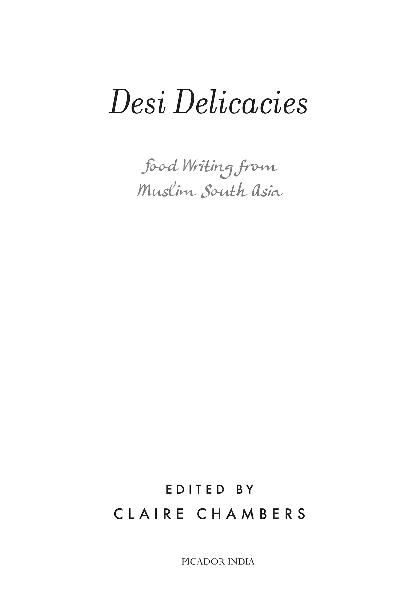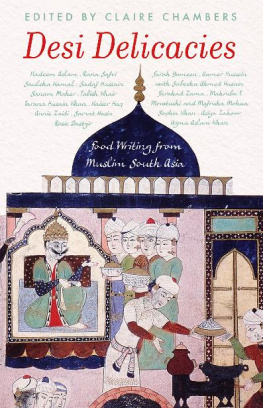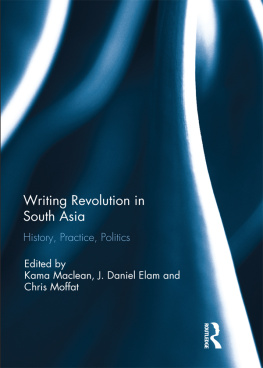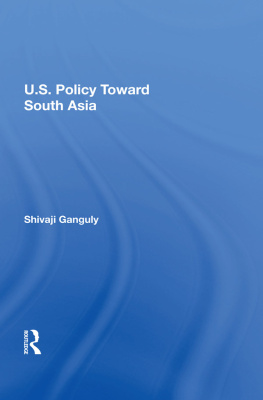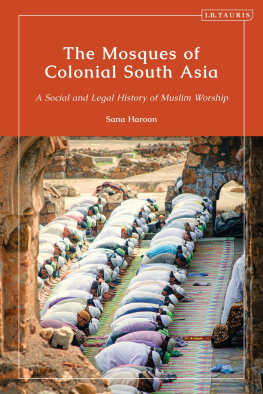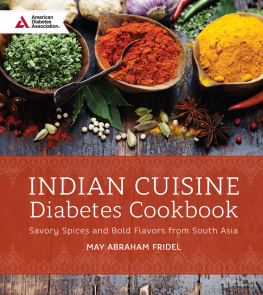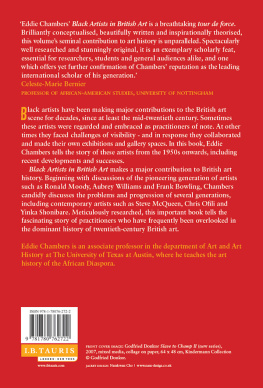Copyright Acknowledgements
The Homesick Restaurant Nadeem Aslam
Qissa Qorma aur Qaliyya Ka (All about Qormas and Qaliyas) Rana Safvi
Paye, Pressure and Patience: Life in Pakistani Cooking Sauleha Kamal
Alhamdulillah: With Gratitude and Relish Kaiser Haq
The Rise of Pakistans Burger Generation Sanam Maher
Jootha Tabish Khair
Chewing on Secrets Annie Zaidi
Stone Soup Sarvat Hasin
High on Chai and Samosa Sadaf Hussain
Aftertaste Tarana Husain Khan
A Brief History of the Carrot Rosie Dastgir
The Hairy Curry Asiya Zahoor
The Origin of Sweetness Uzma Aslam Khan
The Night of Forgiveness Farah Yameen
Whats Cooking? Aamer Hussein with Sabeeha Ahmed Husain
But There Are Angels Farahad Zama
Jackfruit with Tamarind Mahruba T. Mowtushi and Mafruha Mohua
Hungry Eyes Sophia Khan
The Homesick Restaurant was first published in the New York Times.
The aphorism and the poem in Alhamdulillah: With Gratitude and Relish are both from Kaiser Haq, Published in the Streets of Dhaka: Collected Poems (Dhaka: Dhaka University Press, 2015).
The Rise of Pakistans Burger Generation was first published in Al Jazeera online.
Versions of Whats Cooking? have appeared in collections brought out by ILQA Publications in Pakistan and HarperCollins India.
Desi Delicacies and the broader research project Forgotten Food are supported by the Arts and Humanities Research Council (AHRC) in the United Kingdom of Great Britain and Northern Ireland.
For Derry: chefs kiss
Some men drink the blood of other men,
All I drink is wine.
The Sabri Brothers Qawwali Saqia aur Pila
Translated from Urdu by Mohsin Hamid in Moth Smoke
Good morning, Bangladesh, good morning.
How are you?
Bangladesh, sometimes youre busy husking rice
in a cheap striped sari...
At times you carry a pitcher on your hip
to fetch water, fall to chatting
at the ghat...
At siesta time in hot summer
offer paan and areca nut to a guest,
cook a delicious fish curry...
Good Morning, Bangladesh by Shamsur Rahman
Translated from Bengali by Kaiser Haq
O ye who believe! Eat of the good things
wherewith we have provided you, and
render thanks to God.
Quran, 2:172
Measurements
Volume
Metric (ml) | Imperial (fl oz) | US cups |
| | |
| |
| |
| |
| |
| |
| |
| 1 tbsp |
Weight
Imperial (oz) | Metric (g) |
|
| |
| |
| |
| |
| |
| |
| |
| |
| |
| |
| |
| |
| |
| |
| |
1 lb | |
CONTENTS
Foreword: Appetizer
Bina Shah
Food and cooking have so often been compared to alchemy that I hesitate to use this overworked metaphor to describe the culinary arts of Muslim South Asia. Yet I cannot help but think of the early Muslim scientists in the classical age of Islam, who looked at the efforts of Chinese, Egyptian, Greek and Christian alchemists to prolong life and turn metal into gold. The alchemists believed that the four elements earth, air, water, fire needed a fifth element, quintessence or aether (variously interpreted as the air the gods breathed, a vacuum, nothingness), to make this transmutation possible, to turn base materials into noble ones.
These medieval Muslim scientists began their explorations into the same endeavours, but somewhere along the way they turned away from the more occult and superstitious aspects of alchemy. Notable among them were Al-Kindi, who distinguished alchemy from chemistry, and Ibn Khaldun who, a century later, wrote against disguising silver with a thin layer of gold. These thinkers distilled their experimentation into what became the basis of modern chemistry, which has a magic all its own for its proponents and for humanity, which benefits so greatly from scientific discovery.
The preparation, cooking and serving of food in Muslim South Asia, with its attendant science, rituals, folklore, superstition and occult arts, parallels the dance between alchemy and chemistry of the Islamic Golden Age. But in a Muslim South Asian kitchen, there is no need to separate the two. Cooks and chefs, bawarchis and khansamas of all ages and genders perform their work of taking a myriad of elements and turning them into gold, or concoctions that prolong life. Along the way, they imbue the food they prepare with a fifth element. And in Muslim South Asia, this is not quintessence, but the Divine. Practising Muslims firmly believe that it is this element which raises their food from the stuff of mere subsistence to a treasure that has come their way because of Gods mercy and beneficence, and which bestows blessings upon anyone who consumes it.
Many cooks will invoke Allah, start their preparations with a bismillah, pray and blow duas prayers or invocations into the food as they prepare it. How many chefs in the Mughal region must have bowed in supplication to God that their culinary creations would please their kings and emperors? How many women in Muslim households create food for the Ramadan meals of sehri and iftar in the hope that their toil will bring them sawab or reward for enabling their households to keep their fasts? How many people make food and distribute it among the poor in times of need, believing that in preparing a dish of sujji on Shab-e-Barat or a deg of biryani at a funeral, they are building a house for themselves in the afterlife (presumably without a kitchen in which to toil)? This is strong magic.
Or, if Allah is not foremost in the mind when preparing food, then it is love which is the quintessence, the fifth element which transforms food into feast, drudgery into service, toil into pleasure. Muslim South Asian cookbooks abound with tale after tale of a young child growing up watching a beloved grandmother preparing elaborate meals, sitting at the family dastarkhwan amid dozens of relatives and friends, participating in an Eid feast or perhaps wooing a possible lover with the dishes that one grew up eating in ones ancestral home. The recreation of these meals, the offering of household menus or secret recipes is the desire to feel again that love, remember it, spread it, bask in it, no matter how badly the onions and garlic and spices make the clothes smell or the curtains reek.
Muslim South Asian cooking performs many magical deeds which we might assign to the Sufi saints. It facilitates time travel: one bite of the siri paye takes you back to a wintry morning in a village in Punjab when you were a child. It brings back the dead: opening a cookbook that your long-deceased nani compiled returns the sound of her voice instructing you how to cut the vegetables just so, and the sight of her hair braided or tied up in a bun. One glass of lassi, and you may find yourself as deeply asleep as one of the Companions of the Cave in Surah Kahf.
